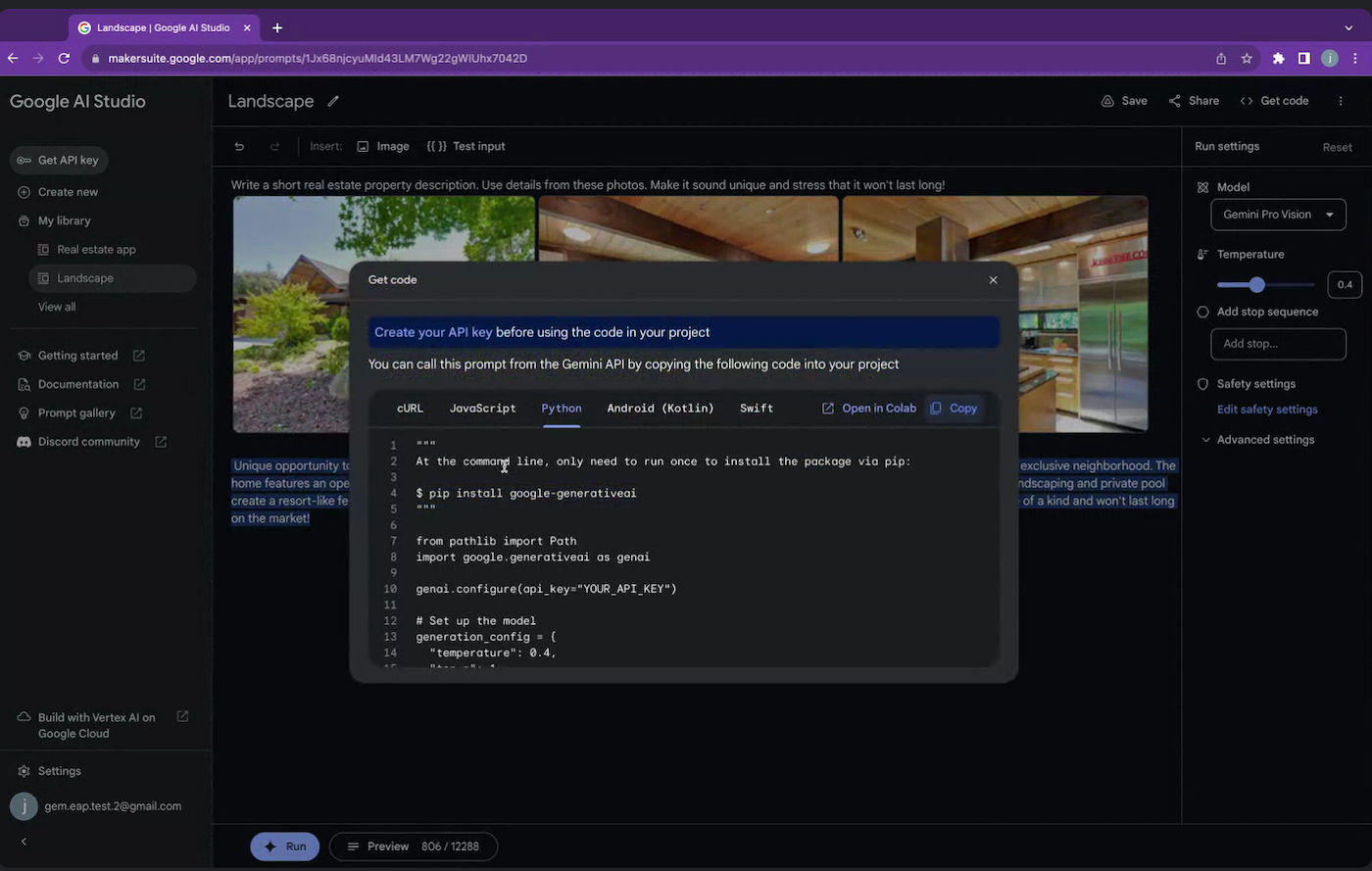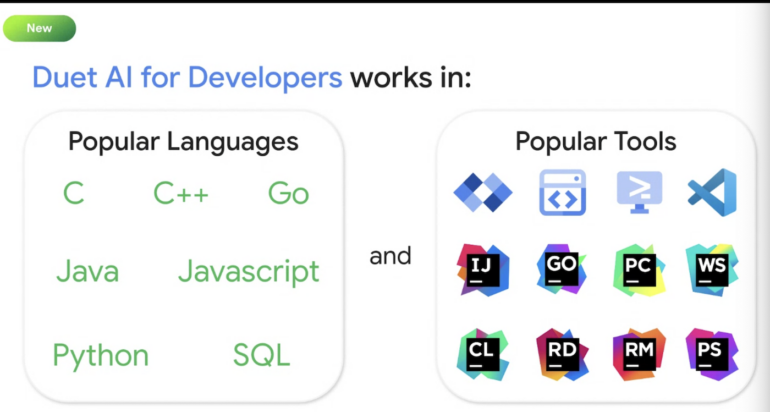[ad_1]
Starting Dec. 13, developers can use Google AI Studio and Vertex AI to build applications with the Gemini Pro API, which allows access to Google’s new generative AI model. Google’s initial rollout of Gemini was limited to Google Bard and the Pixel 8 Pro, so Wednesday’s general availability of Gemini for Google AI Studio and Vertex AI marks the first test of Gemini for enterprise developers. AI Studio and Vertex AI with Gemini can help developers build apps with generative AI powered by Gemini. Plus, Google’s Duet AI assistant chatbot is coming to developer and SecOps tools.
Jump to:
Google AI Studio helps small businesses and individual developers build generative AI
On December 13, Google announced the general availability of Google AI Studio. Google AI Studio is a web-based development environment with which to discover the Gemini Pro APIs, create prompts and fine-tune the Gemini model. Google calls this its “fastest way to start building AI,” said Google Cloud CEO Thomas Kurian during the prebriefing.
The Google AI Studio will first show developers a prompting interface. From the prompt, developers can get an API key (Figure A) that can be deployed right from Google AI Studio or moved to Vertex AI by changing three lines of code.
Figure A

Vertex AI with Gemini is a generative AI platform for enterprise developers
Vertex AI, Google’s fully managed AI platform with support for Gemini, is generally available as of December 13. It helps developers discover AI models and build search and conversation applications with low or no code.
SEE: Is it better to use Google Bard or Google Search to find information? (TechRepublic)
Gemini Pro is now in the Vertex AI model garden, as is Gemini Ultra, but the latter is only available to select customers in private preview. Vertex AI’s model garden includes Imagen 2, the next update to Google’s image processing model. Imagen 2 can make photorealistic images and perform text rendering for logos and product names, for example.
More than 130 AI models from Google, open source and third parties are available. These include Gemini Pro ImagenMedLM (a suite of medically trained models) and Mistral, ImageBind or DITO (three open-source models).
Vertex AI with Gemini can do tuning, including adapter tuning, fine tuning, low rank adaptation (which requires less data), prompt design and step-by-step distillation (which means taking a larger model and having it teach a smaller model). Developers can tune and customize Gemini with reinforcement learning from human feedback. Vertex AI gives developers support to collect human feedback and automate the way it can be used to customize Gemini.
Vertex AI with Gemini includes:
- Grounding, or comparing the generative AI model’s generated answer to the information within a company’s own system or well-known web sources.
- Citation checking, with which Gemini will show its sources.
- 18 kinds of safety filters.
- Up-to-the-minute real-world information from retrieval augmented generation and embedding.
Developers can add new capabilities to the models, such as extensions and functions. Extensions are a mechanism to connect Gemini to enterprise apps and systems to retrieve information or allow Gemini to take action on behalf of the user in enterprise apps. With functions, developers can compare data in their app to data generated by Gemini to improve the quality of Gemini’s answers.
What about building apps in Gemini and moving them to a production environment? Google has automation evaluation metrics, monitoring, model registry and governance for those purposes.
Model tuning and customization in Vertex AI with Gemini Pro is a symmetrical experience, meaning anything you can do in the UI you can do in code, including Python, Node.js and Java.
Gemini supports 38 spoken languages. During the prebriefing, Nenshad Bardoliwalla, AI/ML product leader on the Vertex AI platform at Google Cloud, demonstrated Gemini’s ability to generate text in Spanish.
Gemini for Vertex AI Search and Vertex Blended Search
A few new Gemini-powered capabilities are coming in early 2024 to Vertex AI Search, which can search organization intranets for answers, and Vertex AI Conversation, a low-code or no-code environment to build chatbots.
Vertex AI Search will use Gemini for answer generation and summarization. Another new feature is Vertex AI Blended Search, which uses Gemini to search across many different applications, for example, a company’s retail catalog, inventory management system and transportation logistics system. In the last version of Vertex AI Search, users needed to do different searches for different data sources and different modalities. With Gemini, the data can be searched together.
Gemini will power Advanced Search in Vertex AI Search, which helps developers build search and recognition systems with multimodal capabilities.
Vertex AI Conversation is for multi-channel, multi-modal conversations. It can produce human-like voice and text responses for call centers, mobile apps or the retail point of sale. Conversation trees with Vertex AI Conversation can be created using Natural Language Playbooks instead of code, like training a human.
Google’s Duet AI news for developers
While the AI assistant Duet AI has been available in Google Workspace since August 2023, Duet AI is now available in two new enterprise products: Duet AI for Developers and Duet AI in Security Operations. Neither product runs on Gemini for now, though Google says Gemini will come to Duet AI for Workspace in early 2024. All Duet AI services will incorporate Gemini “over the next few weeks,” Brad Calder, vice president and GM of Google Cloud Platform, wrote in a press release on Dec. 13.
Duet AI for Developers
For now, Duet AI for Developers can do code completion, code generation, code refactoring, documentation generation, unit test generation, application deployment and operational diagnostics. Duet AI for Developers works in a wide variety of languages (Figure B) and interoperates with tools such as Visual Studio Code.
Figure B

Duet AI for Developers will be free from December 13, 2023 to February 1, 2024. After Feb. 1, interested developers are asked to contact Google Cloud for pricing. Duet AI for Developers is available in the U.S., Europe and Asia Pacific. Google plans to expand it to additional regions by early 2024.
Google adds Duet AI to SecOps tools
Duet AI in Security Operations, generally available Dec. 13, combines threat intelligence and security operations assisted by generative AI. Developers can ask it what threats might be occurring in natural language and receive a response in natural language. Duet AI in Security Operations scans the organization’s threat intelligence system and compares its data to a customer’s environment to automate threat prediction.
Duet AI in Security Operations runs on Google’s Sec-PaLM, which is a large language model specialized for security.
Existing Google Cloud Security Operations Enterprise and Enterprise Plus customers in the U.S. and Europe will have access to Duet AI in Security Operations at no extra cost. Users of Google’s SecOps platform, Chronicle, will have access to Duet AI at no cost until March 5, 2024. Users in some additional countries will gain access in early 2024.
Gemini competes with AWS’s Generative AI Builder, Microsoft’s Azure AI cloud developer services, IBM’s Watson AI studio and ChatGPT Plus.
[ad_2]